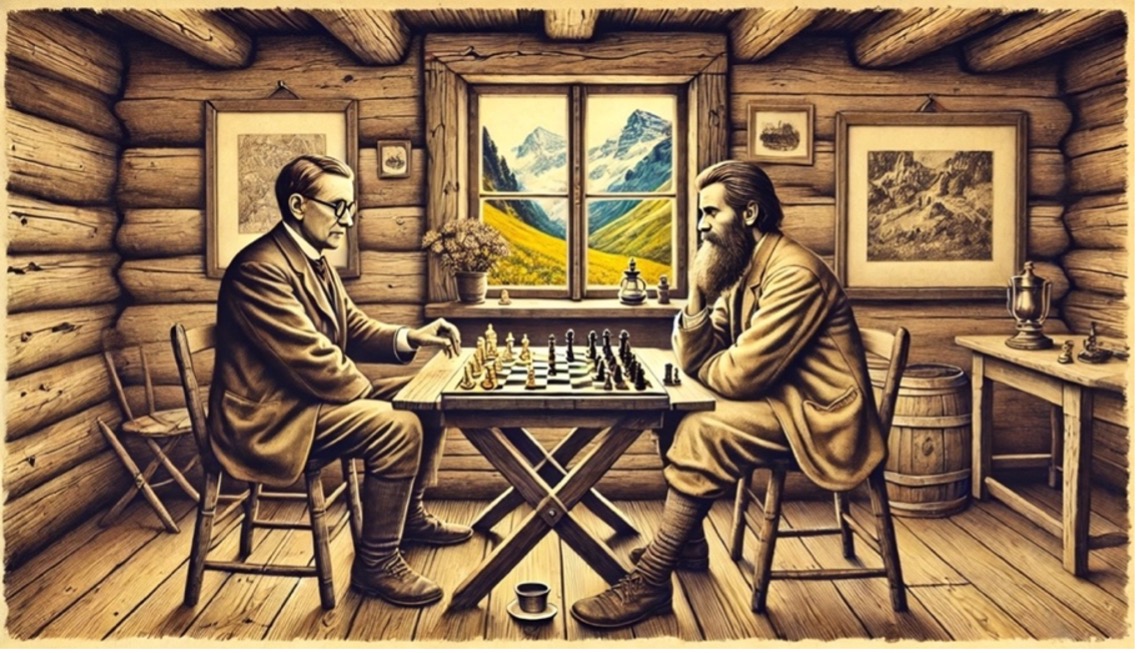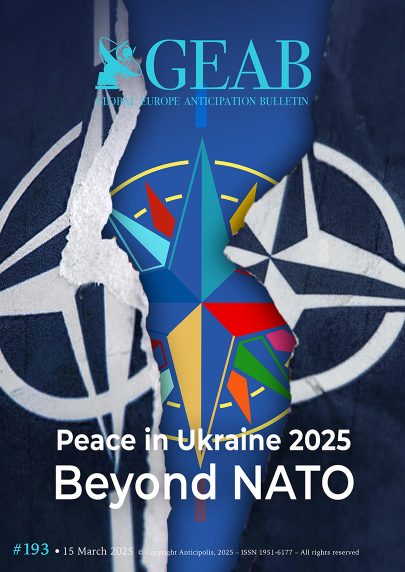GEAB 193
This fiction, edited by Christopher H. Cordey[1] assisted by AI, depicts an imaginary conversation between theorists of two worldviews clashing in the Russian-Ukrainian conflict: American hegemonism on the one hand and civilisational multipolarism on the other.

15 May 2016, 46° 05′ 09.46″ N 7° 44′ 36.92″ E, Refuge du Weisshorn, Canton Valais, Switzerland.
A cool morning settles over the Weisshorn refuge, perched at almost 3,000 metres above sea level in the Swiss Alps. The air is thin but invigorating, carrying the scent of alpine pine and cold stone. Through the frost-lined window, the rising sun sets the snow-capped peaks ablaze in shades of gold and purple. Silence dominates the small dining room, broken only by the occasional clink of china and the faint hum of the wind outside.
Seated opposite each other at a heavy wooden table, two titanic minds of geopolitical thought – Zbigniew Brzezinski[2] and Aleksandr Dugin[3] – grasp steaming mugs of black coffee, their fingers following the contours of the ceramic as if measuring the weight of the conversation to come.
Brzezinski, the arch-critic of American unipolar domination, leans back slightly, his piercing gaze fixed on Dugin. His presence, even at his advanced age, exudes an air of refined pragmatism, polished by decades of developing American grand strategy.
Dugin, the bearded prophet of Eurasian multipolarity, reflects this intensity, his deep-set eyes burning with ideological conviction. Dressed in a robust woollen coat, he looks less like an academic than a revolutionary philosopher. A faint smell of tobacco wafts around him, although he has not yet lit his pipe. For a moment, neither of them speaks. They sip their coffee, absorbing the weight of the challenge before them: to reconcile their irreconcilable visions of the world – unipolarity versus multipolarity – without betraying their deepest convictions.
Brzezinski first puts down his cup, the slight tinkle of which echoes around the room. He clasps his hands together and exhales through his nose, as if the act itself were an exercise in restraint.
Brzezinski: “We are here at a moment of historical necessity. I am convinced that this emerging war in Ukraine will not be just another conflict; it will be the pivot on which the 21st century turns. The question is whether we will be wise enough to shape the future or whether we will let history repeat its worst tragedies”.
Dugin sketches a slight smile, an indecipherable gleam in his expression. Contempt? Amusement? Perhaps both.
Login

History has shown that even the most devastating wars sometimes lead to defining moments—when great treaties are signed, altering the course of the world. These agreements remain in history books [...]
We anticipate that, in a few weeks' time (sooner than we might think), a peace agreement will be signed between Russia and Ukraine, under American guidance, known as the Treaty [...]
Public International Law (PIL) is on the brink of a forced revolution. This revolution, of which Trump will be the catalyst, is based on the inadequacies of the current system. [...]
In a world where the future is unfolding at breakneck speed, the GEAB is inaugurating a new section, Terra Cognita 2089, to refine its short- and medium-term forecasts and continue [...]
Water... let there be soil! In 2019, Saudi Arabia's proven oil reserves were estimated at 263.1 billion barrels. At the rate of production at the time, this was equivalent to [...]
The return to reality of our systems, analysed and anticipated by the GEAB for several years now, is now preparing to conquer the innovation sector. With artificial intelligence occupying everyone's [...]
Market Uncertainty - how smart money survives and thrives 2025 is shaping up to be a year of economic turbulence, with volatility defining global markets. Growth is sluggish, inflation is [...]
Nearly a hundred of you once again chose to respond to the February questionnaire. What stands out is that the question required nuance, as only a third of you identified [...]

Comments